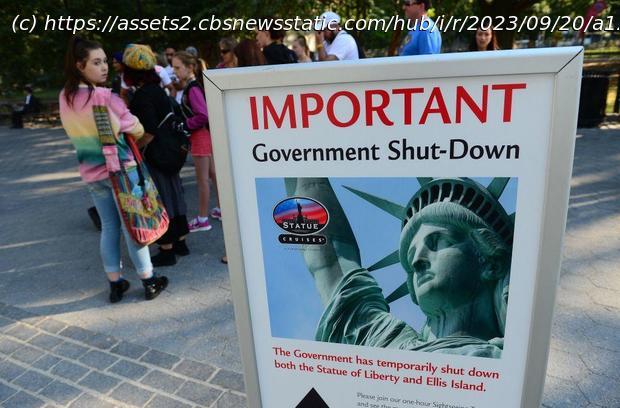The government could shut down in October. Here’s what that means and who would be affected.
Time is running out for House Speaker Kevin McCarthy to find a compromise to keep the federal government running and avoid a costly shutdown.
Republican between moderates and the hard-right has paralyzed the House from passing a short-term funding bill, which is necessary to keep the government open beyond Sept. 30, when funding for federal agencies runs out.
A temporary funding measure by members of the Main Street Caucus and House Freedom Caucus includes an 8% cut to agency budgets, excluding the Defense Department and Veterans Affairs.
Hard-right members swiftly announced their opposition to the measure and have threatened to oust McCarthy as speaker if their demands aren’t met. The bill would also be dead on arrival in the Democratic-controlled Senate, which must also approve funding in order to keep the government open.
McCarthy said Wednesday he would keep the House in session on Friday and Saturday as he tries to find a resolution.
Here’s what to know about what happens during a government shutdown, and what the prospects are for avoiding one this time:What is a government shutdown?
Many federal government agencies are funded annually by a dozen appropriations bills that need to be passed by Congress and signed by the president before the start of the new fiscal year on Oct. 1. These are often grouped together into one large piece of legislation known as an “omnibus” bill.
When Congress does not meet that deadline, the government must fully or partially shut down, depending on which agencies have their annual funding approved. Lawmakers usually buy themselves more time by passing what’s known as a continuing resolution, which temporarily extends current funding levels to keep agencies functioning while they work to reach an agreement on new spending.
The Constitution says the Treasury Department cannot spend money without a law authorizing it. Under a statute known as the Antideficiency Act, agencies are required to cease operations — with certain exceptions — in the absence of funding authorized by Congress. The act, which was first passed in 1870 and has been updated several times since, also prohibits the government from entering into financial obligations without congressional sign-off.
“Treasury cannot pay out any money if there’s not a law providing for who gets the money,” said Matt Glassman, a senior fellow at the Government Affairs Institute at Georgetown University. “If those annual bills expire, then there is no law appropriating money for certain functions.” What happens during a government shutdown, and who is affected?
In a shutdown, the federal government must stop all non-essential functions until funding is approved by Congress and signed into law. Each agency determines what work is essential and what is not. Members of Congress make that determination for their own staff, as well.
“No money can come out of Treasury whether you’re essential or not essential. But who can keep working and incur obligations, even when there are no appropriations — there are three exceptions,” Glassman said.
Those exceptions are defined by the Antideficiency Act. They allow the government to fund operations to protect human life and property, and keep officials involved in the constitutional process on the job, like the president, his staff and members of Congress.
All active-duty military members, many federal law enforcement officers and employees at federally funded hospitals are considered essential, along with air traffic controllers and Transportation Security Administration officers.
Home
United States
USA — Sport What is a government shutdown? Here's what happens if funding runs out






